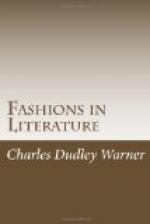Hamilton W. Mabie.
FASHIONS IN LITERATURE
If you examine a collection of prints of costumes of different generations, you are commonly amused by the ludicrous appearance of most of them, especially of those that are not familiar to you in your own decade. They are not only inappropriate and inconvenient to your eye, but they offend your taste. You cannot believe that they were ever thought beautiful and becoming. If your memory does not fail you, however, and you retain a little honesty of mind, you can recall the fact that a costume which seems to you ridiculous today had your warm approval ten years ago. You wonder, indeed, how you could ever have tolerated a costume which has not one graceful line, and has no more relation to the human figure than Mambrino’s helmet had to a crown of glory. You cannot imagine how you ever approved the vast balloon skirt that gave your sweetheart the appearance of the great bell of Moscow, or that you yourself could have been complacent in a coat the tails of which reached your heels, and the buttons of which, a rudimentary survival, were between your shoulder-blades—you who are now devoted to a female figure that resembles an old-fashioned churn surmounted by an isosceles triangle.
These vagaries of taste, which disfigure or destroy correct proportions or hide deformities, are nowhere more evident than in the illustrations of works of fiction. The artist who collaborates with the contemporary novelist has a hard fate. If he is faithful to the fashions of the day, he earns the repute of artistic depravity in the eyes of the next generation. The novel may become a classic, because it represents human nature, or even the whimsicalities of a period; but the illustrations of the artist only provoke a smile, because he has represented merely the unessential and the fleeting. The interest in his work is archaeological, not artistic. The genius of the great portrait-painter may to some extent overcome the disadvantages of contemporary costume, but if the costume of his period is hideous and lacks the essential lines of beauty, his work is liable to need the apology of quaintness. The Greek artist and the Mediaeval painter, when the costumes were really picturesque and made us forget the lack of simplicity in a noble sumptuousness, had never this posthumous difficulty to contend with.
In the examination of costumes of different races and different ages, we are also struck by the fact that with primitive or isolated peoples costumes vary little from age to age, and fashion and the fashions are unrecognized, and a habit of dress which is dictated by climate, or has been proved to be comfortable, is adhered to from one generation to another; while nations that we call highly civilized, meaning commonly not only Occidental peoples, but peoples called progressive, are subject to the most frequent and violent changes




